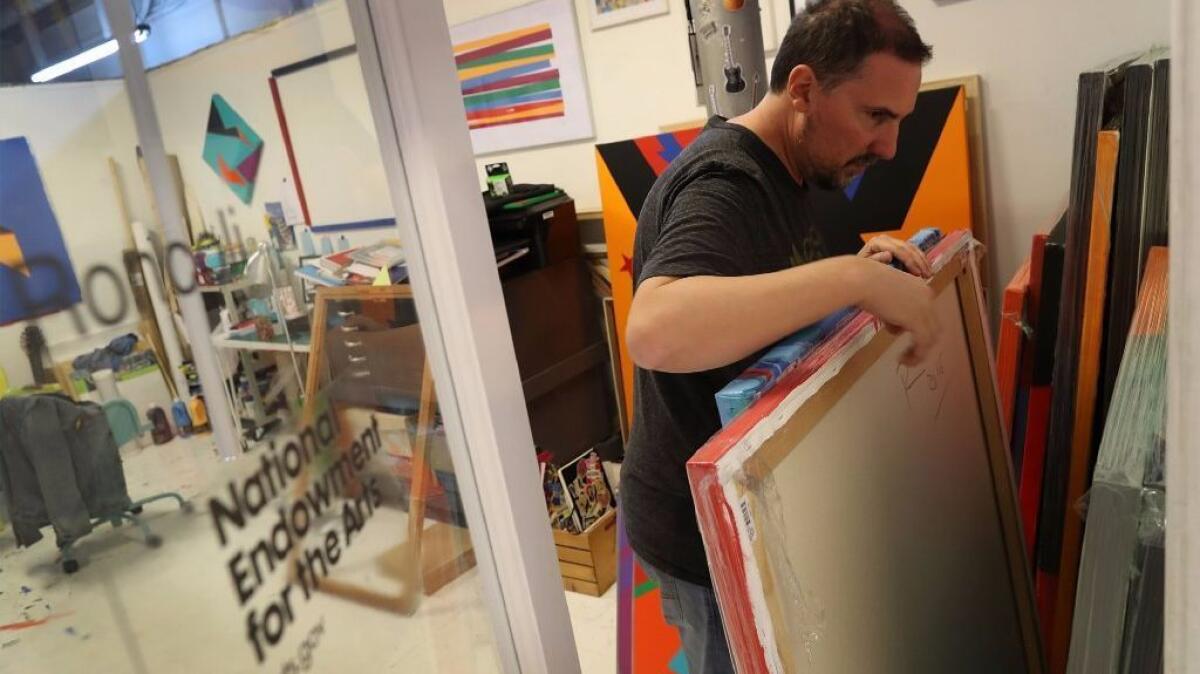Commentary: Yes, Mr. President, all of America deserves to have great art

- Share via
The budget blueprint that President Trump revealed proposes the elimination of the National Endowment for the Arts. This is the third time in my professional theater career that the agency is imperiled. I raised my voice in its defense in the late-1980s and mid-1990s, and I am proud to do so again.
My colleagues in the nonprofit arts nationwide are also speaking out. Many of their excellent points bear repeating: that last year’s NEA budget of $149.8 million was 0.004 percent of the overall federal budget. That NEA funding reaches every single congressional district. That NEA grants require matching funds that generate two to three times their impact upon recipient organizations. That the prestige conferred by an NEA grant makes funding from other sources flow more readily. That the NEA is an important funder of state arts councils, many of which would themselves fold along with the agency.
To these I’ll add: That over a third of NEA grants support work with underserved populations such as veterans, Americans with disabilities and Americans in institutional settings. That nearly half of NEA-supported programs serve low-income or high-poverty communities. And most important of all, that NEA funds provide access to the arts in areas where precious little such access exists.
The NEA is about enfranchisement. Above all else, its central belief is that the arts matter, and its impact is greatest in places where the arts are scarce.
The abolition of the NEA would not greatly damage The Old Globe, a thriving theatre in a city rich with arts infrastructure. Our 2017 funding from the agency totals $64,700, a sum that is but a fraction of our $24.1 million projected total earned and contributed income this year. But without the NEA, some of our most impactful work would shrink.
Our 2017 NEA funds will help support two Globe programs: free matinee performances for students in Title I schools and a community-based program that brings Globe teaching artists to underserved neighborhoods to conduct workshops in playwriting that help citizen-artists develop plays on local themes. These initiatives focus entirely on enfranchising lower-income San Diegans by providing them access to Globe programming that, absent this public support, they would not otherwise enjoy.
Indeed, going back to the late 1990s, nearly every single NEA dollar the Globe received went to opportunities for lower-income San Diegans to engage with our work. Even grants that were not targeted to this group ended up serving them: in 1998 a $31,500 NEA grant helped develop “Dr. Seuss’s How the Grinch Stole Christmas!” Tens of thousands of Title I students — not to mention countless San Diegans of every stripe — cherish our annual holiday-season tradition.
Abolishing the NEA is a lose-lose proposition. It won’t save the country much money, and the people who will feel the harsh sting of the agency’s demise will be the very ones who need it most. Lower-income Americans, Americans in cities whose resources are few compared to San Diego’s, rural Americans, these are the beneficiaries the NEA enfranchises by including them in artistic endeavors.
Art is a public good. The arts matter, and the NEA helps them matter to more people. All the things that art can do — encourage expression, develop emotional intelligence, foster empathy and understanding, make experiences of joy and beauty — are necessary to all of us, but they are indispensable to our fellow citizens whose life circumstances can be most positively impacted, even transformed, by story and song, poetry and painting.
The arts are always an easy target. Throughout my career, I’ve found that an erroneous view of the arts as a redoubt of the so-called coastal elites persists despite overwhelming evidence that American arts participation is hugely broad-based. Public arts funding is a bogeyman, a battlefield for skirmishes in the culture wars. After all, if fiscal prudence is the goal, then cutting the tiny NEA won’t get the bean counters very far. Something else is at play.
If politics is the driving force behind the president’s budget, then we should recall one of the NEA’s most popular slogans. It offers us a rallying cry for every American who values the contributions that art makes to a vibrant and egalitarian society, for every San Diegan who believes that a miniscule government appropriation is worth investing in the grand notion that art should be for all, and particularly for the most disadvantaged among us.
That slogan?
“A great nation deserves great art.”
More to Read
A cure for the common opinion
Get thought-provoking perspectives with our weekly newsletter.
You may occasionally receive promotional content from the Los Angeles Times.






